The U.S. military base known as Fort Devens closed in 1996, jettisoning more than 7,000 local military and civilian jobs.
Get Instant Access to This Article
Subscribe to Worcester Business Journal and get immediate access to all of our subscriber-only content and much more.
- Critical Central Massachusetts business news updated daily.
- Immediate access to all subscriber-only content on our website.
- Bi-weekly print or digital editions of our award-winning publication.
- Special bonus issues like the WBJ Book of Lists.
- Exclusive ticket prize draws for our in-person events.
Click here to purchase a paywall bypass link for this article.
The U.S. military base known as Fort Devens closed in 1996, jettisoning more than 7,000 local military and civilian jobs and gutting a huge driving force of the North Central Massachusetts economy. But in less than 30 years, the former base has established itself as a master-planned business community, an innovation center with companies in the cybersecurity, biotechnology, and healthcare fields.
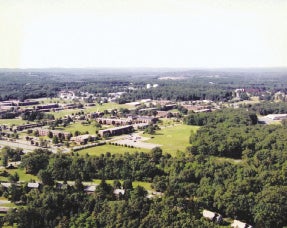
After the military left, management of the former base was transferred to MassDevelopment, the commonwealth’s quasi-public economic development agency. Over three decades, the agency attracted businesses to the area, especially manufacturing companies requiring a large footprint to produce their goods. Devens has 4,400 acres of space, touching the nearby towns of Harvard, Shirley and Ayer, and its companies employ more than 6,000 people – nearly as many as worked there during its military heyday.
Kelly Arvidson, senior vice president of business and economic development at MassDevelopment, said although Devens has more than established itself, there’s still a lot of room to grow.
The current housing market has raised the question of waiving Devens’ housing cap, which is currently set at just 282 units. The agency is working to add more amenities for its existing businesses, like restaurants. And, of course, there are always new businesses to recruit and eventually welcome, like Commonwealth Fusion Systems, which cut its ribbon at Devens in February 2023 and already employs more than 500 people.
“[Devens is] totally economic development-driven, in that Devens is meant to encourage business to come in and not shove it away,” Arvidson said. “That welcoming atmosphere is the starting point.”
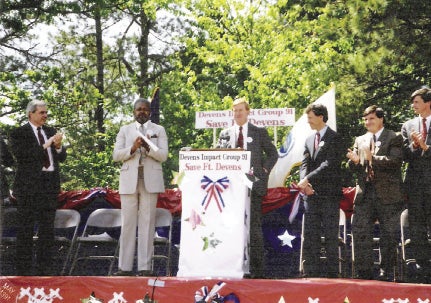
How it works
Employment in Devens is on the rise. In 2020, the community employed more than 6,000 people, compared to nearly 5,000 in 2016 and about 3,200 in 2012, according to a June 2020 economic development impact report from the UMass Donahue Institute.
Devens is well-known across the country for how it transformed a closed military base, Arvidson said. Potential companies come in through brokers, referral services, MassEcon, or the Massachusetts Office of Business Development. Once contact is made, Arvidson said, she’s usually the first person called, working with potential businesses to understand their needs.
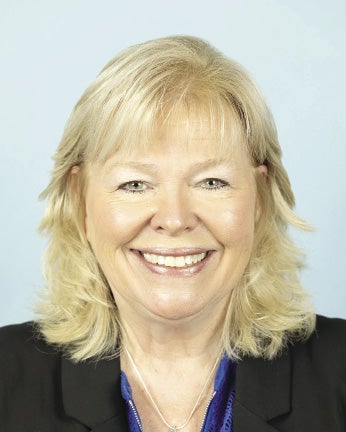
“The very next thing is we’ll get a team together from MassDevelopment, everyone who could possibly have a role – the fire chief, the real estate team, the financing team, and local partners if they need to. It’s one-stop shopping when a company has interest. In an hour, they've answered all their questions,” she said.
Unlike most towns, where businesses must go through various stages of permitting and approval processes, everything in Devens is “front loaded,” said interim executive vice president of Devens Meg Delorier. It keeps things moving quickly. The Bristol Myers Squibb deal was done in 37 days, she said.
“In other communities, there are other boards and as they move forward they provide additional information as they move along,” Delorier said. “In Devens, we need all the info up front.”
That speedy, one-stop-shop process was a big selling point for Paul Sellew, founder and CEO of Little Leaf Farms. The lettuce-growing operation opened its Devens greenhouse in 2015.

“When you're looking to invest capital, and you want to move ahead … you need to have the ability to buy property and get all your regulatory approval in real time,” Sellew said. “With Devens organized as an economic development zone through the Devens Enterprise Commission with its unified permitting process, they clearly made that happen.”
Devens also provided Little Leaf with plenty of space, a huge plus for any production-oriented company. Little Leaf owns between 25 and 30 acres in Devens, Sellew said, and employs more than 100 people at the facility. The company also employs about 400 people at its greenhouses in McAdoo, Pennsylvania.
Plenty of companies clearly love what Devens has to offer, and Dean J. Mazzarella, mayor of Leominster, said his city’s economy has in some ways been boosted by the huge business development.
On the flip side, Mazzarella said he thinks Leominster has also lost potential tax-paying businesses to its state-of-the-art, well-advertised neighbor.
“The redevelopment plan, which we were supportive of, was if a neighboring community could not accommodate a business, the agreement would be they'd go to Devens. Our thought was it would be larger warehouses, transportation depots, that kind of thing. It was everything but,” said Mazzarella, who was elected mayor in 1993. “It’s beautiful, they've done a good job planning it out, but it’s been to our expense. During some tougher economic times in 2008, 2009, and 2010 it's been tough to see new buildings come up when we’re trying to keep business open.”
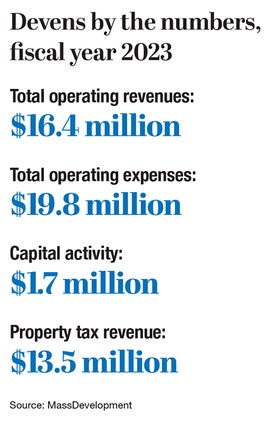
Delorier said that companies are required to exhaust their options in nearby municipalities before beginning their Devens journey. But Mazzarella said many companies he’s met with tend to get mysterious cold feet.
“We take a prospective tenant, and they keep coming up with excuses as to why we can’t accommodate them,” he said.
It’s not all bad though, Mazzarella said. Leominster has certainly benefited from Devens in direct and indirect ways. Leominster companies doing HVAC work or catering or general contracting all have more work to do because of Devens, he said. Plus, people work on-site, or play golf at Devens’ 18-hole Red Tail Golf Club. But overall, Mazzarella said he thinks its impact on Leominster has been a mixed bag.
“It’s tough when you’re less than four miles away from Jackson Gate [an entrance to Devens off Route 2] and you see a company come in that could have easily come here,” he said.
Housing
When the current phase of Devens was being planned, the focus was on bringing jobs back, Delorier said. But in the early 2000s, the question of Devens’ housing stock was raised again. MassDevelopment refurbished historic buildings like officers’ housing and demolished other structures contaminated with a pesticide widely used in the mid-20th century, Delorier said.
In March of this year, Gov. Maura Healey released an economic development bill that would do away with the 282-unit housing cap, paving the way for substantially more housing at the former military base.
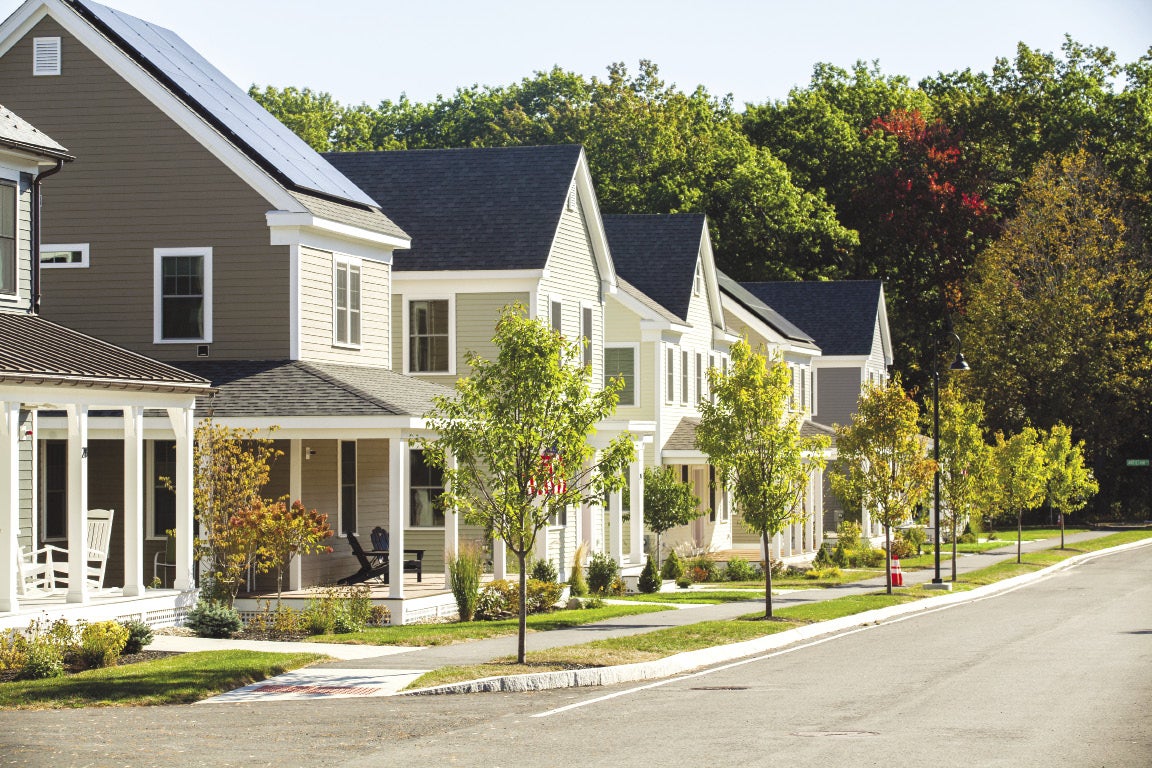
Mazzarella said Devens was always supposed to have more housing. He said he hopes the site can help provide housing to the state’s homeless population or help refugees who need a place to live.
Delorier said she’s hopeful the housing cap will be lifted. But housing isn’t the only aspect MassDevelopment wants to grow. Projects like Pathway Devens are creating huge campuses on site, with a focus on attracting technology companies and providing them with open space, recreational activities, and socializing at a meeting space called the Canteen. Sterling Street Brewery of Clinton opened a taproom inside the Canteen in May, and MassDevelopment is in talks with other restaurants to bring more options to the former base.
“We’ve built this great life science and biomanufacturing hub, but we’re adding amenities that these young workers need, like a good restaurant scene,” Arvidson said. “We’re working on that part of it now. It’s critical.”
